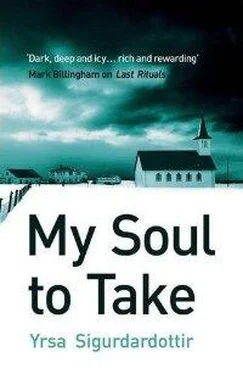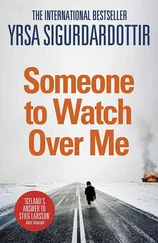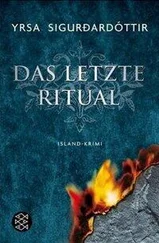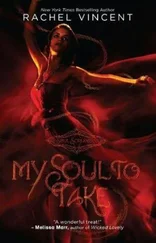Thóra nudged Matthew and nodded in the direction of the young man walking past. “That’s Jökull, the waiter who was so unpleasant about Birna,” she whispered as she stood up. “Something must have happened to make him hate her that much. I’d love to know what it was.” They’d been drinking coffee in an alcove off the hotel lobby and debating their next move—inconclusively, although they agreed that they would have to find Birna’s lover, Bergur from Tunga. They couldn’t work out how to approach him and Thóra was bored stiff with discussing it, so the waiter was a welcome distraction.
She strode after him. He was heading for the dining room, but Thóra managed to tap him on the shoulder before he escaped inside. “Hello.” She smiled. “Remember me?”
Jökull turned, caught off guard. “Huh? Oh, yes. Aren’t you the lawyer?”
“That’s right. My name’s Thóra. Have you got five minutes? I’d really like to talk a bit more about Birna.”
The waiter looked at his watch. “Sure, why not. But I can’t tell you much. You know what I thought of her. There’s really not much more to say.”
“You never know,” replied Thóra. “Can we sit down here?” She pointed to a sofa that had been positioned in the corridor and was clearly intended to be merely decorative. This was probably the first time it had been used, she thought as she sat down. She patted the seat beside her, sending up puffs of dust. “How do you know her? Just from the dining room?”
Jökull perched on the edge of the sofa. “I didn’t know her really, but this isn’t a big place so I couldn’t help seeing her sometimes. I haven’t been working here long and I avoided her, so we never became particularly well acquainted. I’m the last person who can tell you anything about her.”
Thóra frowned. “I don’t understand—you say you hardly knew Birna, but you seem to have formed a very strong opinion about her. Very strong, and very negative. There must be a reason.”
A flash of anger passed across his face. “I’m just a good judge of character,” he said, without further explanation.
Thóra decided to head into safer waters so as not to scare him off. “Your name’s Jökull, isn’t it?”
“Yes,” he answered, still on the defensive. “Jökull Gudmundsson.”
“Are you a local?” she asked.
“Yes, actually, I am,” Jökull said. “I was brought up on a farm near here. Then I went to Reykjavík to train as a waiter and stayed on there, but I jumped at the chance to come back when Jónas advertised for staff.”
“That’s understandable,” Thóra said. “It’s quite beautiful. I can well believe that you’d want to come back.”
“Yes, it’s very different from Reykjavík,” replied Jökull, and smiled for the first time.
“Do you know much about local history?” she asked. “For instance, do you know anything about the farm allegedly being haunted?”
Jökull clammed up again. “There’s no point talking about ghosts to people from the city,” he said. “You don’t get it. If something’s not made of tarmac or concrete, you can’t take it seriously.”
Thóra raised her eyebrows. “I’m not putting down your belief in the supernatural—I’m actually preparing litigation for Jónas, which involves ghosts. That’s all there is to it. Any knowledge you might have about local ghost stories would be very useful to me.”
“I’m sure it would,” Jökull said mutinously. “But you’ll have to get it from someone else. I’m no expert on ghost stories, although I do know a few. I think the world’s a complex place, and people from Reykjavík don’t know everything there is to know.”
“In that case, forgetting about the ghosts, do you know anything else about the place? For example, would you know anything about the people who used to live on the farm?”
Jökull shook his head. “No, nothing. I’m not old enough to be interested in history.”
That was a good point, thought Thóra, making a mental note to look for older people who knew the area. “Do you still have any relatives here?”
“One sister.”
“Did your parents move to the city?”
“No, they died,” Jökull answered tersely.
“Oh, I’m sorry,” said Thóra. She didn’t want to pry. “Forgive my obsession with local history, but do you know anything about a Nazi movement that operated around here?”
Jökull’s eyes widened, and she believed him when he responded instantly, “No, I’ve never heard of it. Although I don’t chase around after the past, I’d definitely have remembered that. That can’t be true.”
“You’re probably right,” Thóra replied. “But since you come from around here, there’s one thing you can definitely tell me. It’s nothing to do with the past.”
“What?” asked Jökull suspiciously.
“I met a young man today and I think he’s from around here. I can’t work out how old he is, but he could be your age. He was in a wheel-chair and in a terrible state, probably from burns. Do you know what happened to him?”
Jökull didn’t answer. He stood up. “I’ve got to go and work. Your five minutes were up ages ago.” He pressed his lips tightly together, as if afraid to speak.
“So you don’t know him?” Thóra asked, standing up as well.
“I’m late. Bye,” said Jökull.
Thóra watched him walking away. She had clearly struck a nerve. “He was very odd,” said Thóra, taking a sip of her coffee. It had long since gone cold. She swallowed and pulled a face.
“Do you think he’s connected with the murder,” Matthew asked, “or is he just a bit weird?”
“To tell the truth, I don’t know whether he’s involved. He clearly hated Birna, but he wouldn’t explain why. He just said he was ‘a good judge of character.’ Might he be an ex-lover? Perhaps she dumped him for the farmer.”
“Or maybe he really is just a great judge of character.” Matthew shrugged. “I’m starving. What time is it?”
Thóra ignored him. “No, there’s something weird going on. And he turned on me when I asked about the young man in the wheelchair.”
Matthew was shocked. “You asked about him? What on earth did you do that for?”
“I just did. They are both from around here and about the same age. I thought he might know what happened,” she said. “I know I can be a bit too nosy, but I didn’t expect a response like that—what reason would Jökull have to be touchy about it? At least now I know I have to find out what happened.”
“I just think that’s really inappropriate,” Matthew said, still scandalized. “Asking personal questions about a complete stranger. And he’s disabled.”
“So? Is it illegal to ask about disabled people?” replied Thóra. “You’re just grumpy because you’re hungry. Let’s go and have something to eat.” She stood up.
Matthew perked up. “Why don’t we go somewhere else to eat?” he asked. “Is there anywhere nearby?”
“Sure,” she said. “There’s Hellnar, for example. Who knows, we might meet someone who’ll tell us about the ghosts, or about Bergur the farmer.”
Matthew groaned. “God, I hope not.”
With a mighty effort, Eiríkur opened his eyes. The aura reader was suffering from his worst headache in years. He tried to move, but was immediately seized by such overwhelming nausea that he had to squeeze his eyes shut. When the worst had passed, he tried to get his bearings. What had happened? Had he been drinking? He didn’t think so, and there was no taste of alcohol in his mouth. He vaguely recalled laying out tarot cards in the staff cottage—had he been telling his own fortune or someone else’s? He had a feeling he’d had words with Jónas, but couldn’t remember what it was about. Would it have been something to do with his job, or the tarot reading? He couldn’t remember.
Читать дальше












